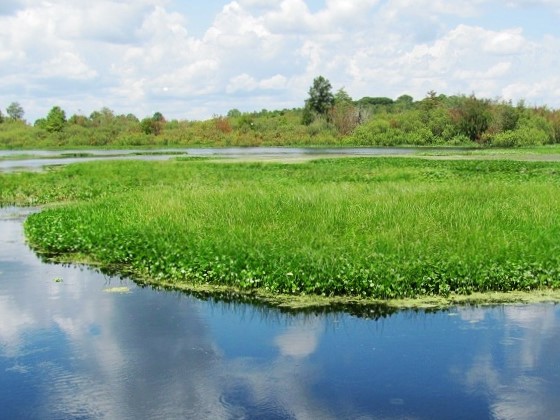Monitoring Aquatic Plants and Their Management
The Florida Fish and Wildlife Conservation Commission (FWC) administers federal and state funds to manage invasive and nuisance growths of aquatic plants in Florida public lakes and rivers. FWC biologists conduct site inspections to monitor aquatic plants and their management under six different scenarios.
Annual Inventory
FWC biologists inventory aquatic plants annually in Florida’s approximately 460 public lakes and rivers which comprise approximately 1.25 million acres of fresh water. Public lakes are sovereignty lands (owned by the State of Florida) accessible by public boat ramp. Annual inventories are a tool to detect new invasive plants, to document current levels of invasive plants, to establish management needs and priorities for the ensuing year, and to evaluate impacts from invasive plants and management programs. All aquatic plant species detected are recorded. Acreages are estimated for the . Inventories are conducted at approximately the same time each year, to make annual comparisons more valid. All public waters are inspected at least annually; some are inspected numerous times depending on the level of management operations, but only one inventory is filed.
Fiscal Accountability
FWC biologists evaluate aquatic plant control operations by public agencies and private companies under contract with FWC. These evaluations document the cost and efficacy of the operations. Biologists inspect contractors' daily logs to select a recent control event, and conduct a site inspection to evaluate the level of control achieved. If necessary, FWC biologists make recommendations to improve efficacy or selectivity. Each contractor is inspected at least three times per year; or more, depending on the level of operations in the contract area.
Pre-Management Survey
Aquatic plant management objectives and priorities are established at the beginning of the State Fiscal Year (July 1 – June 30). However, environmental conditions and public use patterns change throughout the year. FWC biologists and government agency contractors conduct site inspections before scheduling aquatic plant management operations, to determine which, if any, plants should be controlled; to refine control strategies; and to ensure that the control program remains compatible with current conditions in and around the waterbody.
Post-Management Survey
FWC biologists and government agency contractors conduct post-management site inspections to observe the level of control achieved. Post-management inspections are especially important for protracted management operations using systemic, slow-acting herbicides. Large-scale hydrilla-control programs using systemic herbicides often require some measure of water and plant sampling to ensure that the herbicide dose is sustained at the required level for the prescribed duration; and to evaluate the response of target plants, as well as any impacts to non-target plants.
Routine or Ad hoc Inspection
FWC biologists may be visiting a public water body to conduct a site inspection for a permit or may simply be in the area. If they observe conditions related to FWC-funded aquatic plant management (i.e., new invasive plant observation or existing plants needing management), they report their findings to the contractor.
Complaint Response
FWC and government contractors occasionally receive inquiries or complaints ranging from not enough control to too much control, or complaints of alleged adverse impacts on non-target plants or animals. Issues related to FWC aquatic plant management authorities and objectives are followed up with a site inspection; if possible, with the person who initiated the inquiry. If plants need control, the appropriate contractor is notified. If adverse incidents have occurred, other appropriate agencies or stakeholders are notified, and corrective actions are evaluated and incorporated into future control operations.


